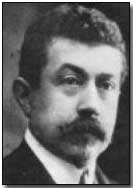Primary Documents - Paul Painleve on the Second Battle of the Aisne, 7 July 1917
 Reproduced below is the
text of French War Minister
Paul Painleve's public
statement (dated 7 July 1917) in the wake of the failure of the French
Army's
offensive at the Aisne and Champagne.
Reproduced below is the
text of French War Minister
Paul Painleve's public
statement (dated 7 July 1917) in the wake of the failure of the French
Army's
offensive at the Aisne and Champagne.
The French Army's failure to achieve success during the Aisne/Champagne offensive - which was opposed outright by Painleve, who foresaw disaster - directly led to the replacement of the Commander-in-Chief Robert Nivelle. Nivelle, who had promised an end to the war through victory at the Aisne, was replaced by Henri-Philippe Petain.
Click here to read Kaiser Wilhelm II's reaction to news of the French failure at the Aisne and Champagne. Click here to read Erich Ludendorff's official announcement dated 28 April 1917.
Paul Painleve, French Minister of War, on the Third Battle of the Aisne and Second Battle of Champagne, 7 July 1917
Grave mistakes were made in the course of our last offensive. We care neither to deny nor to minimize them. France is sufficiently sure of herself to be able to look the truth in the face.
Yes, the price paid for the results that were obtained were paid for too dearly. It is true we suffered heavy losses, which, though they fell short of the fantastic figures that have been set about no one knows by whom, were unnecessarily heavy losses which could have been avoided and must be avoided in the future.
The heads of the army on whom falls the responsibility for these mistakes have, in spite of the glorious services to which they might have appealed, been relieved of their command. [NB: On May 17th General Nivelle was withdrawn from command and General Petain appointed in his stead. General Foch was made Petain's Chief of Staff.]
We must have done with rash plans whose grandiose conception hardly hides their emptiness and lack of preparation. We must have a rational and positive war policy, endowed with a prudence that is quite consistent with energy, but does not force impossibilities from human flesh and blood.
Such a policy more than ever necessary now is to be that of the Government. This policy will enable us to keep strong until the final battles, and it will enable us to give our army a powerful armament of munitions and of heavy artillery.
This policy, fruitful in results but economical in human life, we now know for certain will be followed in the future, since the General who is now at the head of the army has made himself the protagonist of it. After the attack on Carency, one of the most glorious episodes in this war, General Petain did not shrink from declaring that infantry was powerless against entrenchments that had not been overthrown by artillery, and in consequence he has never failed to employ these tactics of artillery preparation for attack.
Our Allies, he said, know that nothing can bend the will of France. Whatever happens she will not fail in her task. But they know also that our army is like an army which protects civilization, and that its blood is flowing in streams.
This thought, more than any other, determined the United States to enter the struggle. They did not wish France to resemble the funeral pile which illumines the world while consuming itself. The Government can give you the assurance that France will be able to reconcile her military effort and her economic effort.
Victory is certain on the one condition that the morale in the country remains intact. Our soldiers must fight, resist, and die at their posts. History will say that they reached the limits of human courage. Our Republican army must know why it is fighting. Victory or submission, as President Wilson said, that is the alternative. There is no other.
If our will should seem to bend, if a crack should seen to appear in the military bloc of the Allies, you would see the engaging smiles of Herr Scheidemann succeeded by the atrocious grimace of pan-Germanism.
We shall not allow Prussian militarism to lay its heel on our neck. Until now France has victoriously borne the trial and has resisted the most monstrous attempt. No nation has shown more perfect discipline.
It is necessary that that should continue until the hour of final victory. No impatience and no manoeuvre must intervene to defeat our union.
We have to fight, and whoever advises us now to lay down our arms makes himself the accomplice of our foe.
Source: Source Records of the Great War, Vol. V, ed. Charles F. Horne, National Alumni 1923
The "Red Baron" was the allied nickname for German air ace Manfred von Richthofen, the leading ace of the war.
- Did you know?
